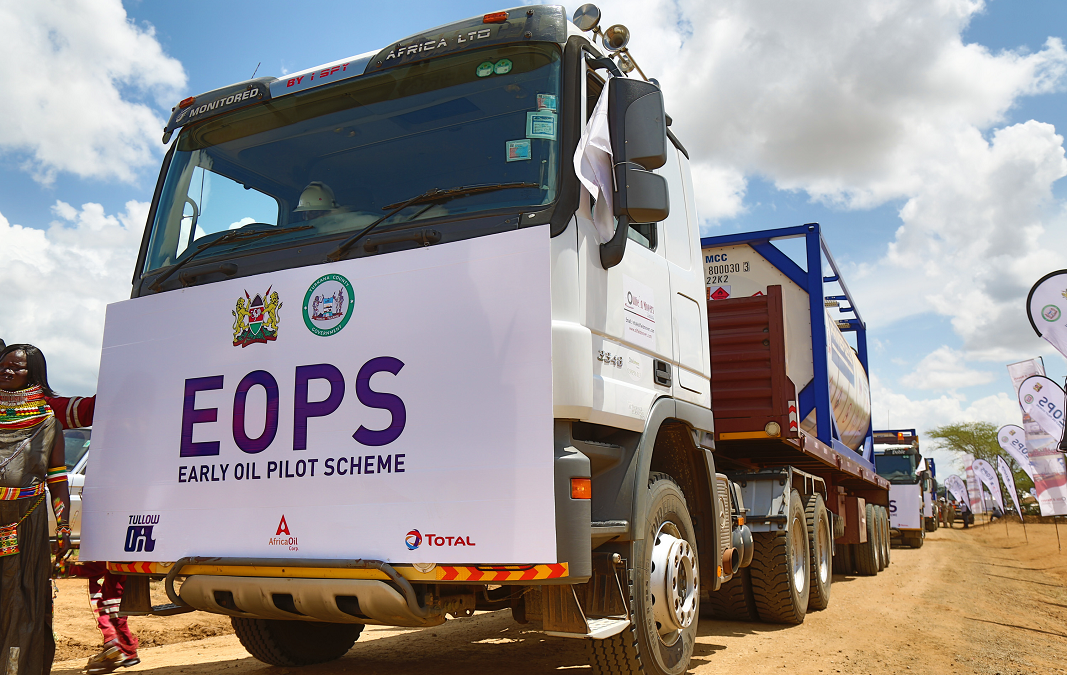Tullow update
It has been a couple of years since Tullow’s successful exploration and appraisal drilling operations in the three concessions blocks within the South Lokichar oil Basin, Turkana County. Since 2018 to early 2021, Tullow worked closely with its Project Oil Kenya-Joint Venture Partners to actualize the Early Oil Pilot Scheme (EOPS), which put Kenya on the map as the first East African country to join the ranks of petroleum-producing nations. The scheme successfully served its purpose to aid in the progress to Full Field Development Plan (FDP).
In mid-2021, the British Oil company downsized including closing offices and handing operations management to Africa Oil, one of its joint venture partners. The music is now different after Tullow’s minority partners Total and Africa oil issued their notices of withdrawal from the project (Blocks 10BB, 13T and 10BA in South Lokichar). Africa Oil abandoned the project because it opted to concentrate in regions with high petroleum potential. Total on the other hand withdrew because it was considering other options to monetize its stake. The duo owned a 25% stake each of the three blocks in the South Lokichar Basin. As a result, Tullow’s working interest in these blocks has increased from 50% to 100%.
In the midst of all this, Tullow remains focused on securing a strategic partner this year. The project progress continues as the updated FDP was submitted to the Kenyan upstream regulator; Energy and Petroleum Regulatory Authority (EPRA), in March 2023 and is now under review. Tullow will continue to work collaboratively with the Government of Kenya and EPRA to get the Field Development Plan approved. According to the provisions of the Petroleum Act, 2019, the Ministry of Energy and Petroleum Cabinet Secretary are required to submit the Field Development Plan together with the Production Sharing Agreements (PSA) for the 3 concessions to the National Assembly for ratification which is expected to happen before the end of the year.
Pros and cons of the project
Project Oil Kenya has provided various advantages to the people living adjacent to the site as well as general development to Lokichar and Lodwar towns. Local entrepreneurs for example got the opportunity to participate in crude oil transportation through supply of the vehicles towards supporting the project (30 trucks, six light vehicles and one bus), employment opportunities with roles created for drivers, ancillary staff for trucking operations, production and loading operators (AMPS).
In addition to the direct employment benefits, the pilot scheme was involved in developing five existing wells within the Amosing and Ngamia fields. The EOPS project further aimed at improving existing road infrastructure within the South Lokichar Basin as well as enhance project understanding of the project by the Turkana and West Pokot County governments. Tullow dug boreholes to help provide water to the community and their cattle as part of their CSR efforts. Currently, there is a well in Nakukulas and another in Twiga 1 that are still operational and which serve the communities living adjacent to the well sites with water for domestic purposes as well as for their livestock.
Nevertheless, EOPS has remained a controversial subject with different stakeholders arguing out that it was an unnecessary loss-making venture towards Kenya’s journey as an oil producing nation. The Ministry of Energy and Petroleum CS Chirchir during a recent presentation to the senate stated that while 414,777 barrels of crude oil was exported under EOPS, an estimated KES 4 billion was accrued as revenues from the project whereas the total project cost KES 7 billion.
Further disadvantages that have been experienced by the locals and the environment at large as a result of EOPS include gas flaring from extended well testing, poor hazardous waste management, poor grievance handling and inadequate public participation. For instance, according to reliable sources, Tullow didn’t really have a strategic plan for the waste management of hazardous drilling waste. Around Twiga 1 for example, due to the rains the waste spilled over to the lugga resulting in the death of a hundred goats that consumed that contaminated water.
Health complications which were not experienced in the past such as cancer continue to be on the rise as a result of exposure to used High Density Plastic Liners (HDPs) which were used to hold hazardous drilling waste, and which communities now use to cover their manyattas oblivious of exposure to heavy metals and Naturally Occurring Radioactive Materials (NORMS). While the County Government of Turkana has raised concerns over the transfer of hazardous waste from other well pads to the Twiga 1 well pad, soil samples from the landfills which were supposed to be tested regularly by the county government has been a challenge due to lack of resources as the entire process is quite expensive.
Another area of conflict is on the climate change direction that the globe has taken towards a shift to renewable energy and shying from the use of fossil fuels. Kenya being a signatory of the Paris Agreement, puts her in a place of dilemma with the ongoing oil exploration activities.
Moving forward
In order to get to the development and production phase as a country, Tullow needs to acquire a strategic partner as soon as possible. Resources are also required to reduce the risk on the community’s health safety, since there is currently no priority to deal with the hazardous waste management according to industry standards and this has affected the South Lokichar basin ecosystem.
A concerted effort by respective government agencies will be important in ensuring compliance and enforcement of national policies and laws that safeguard the environment and the community at large. Furthermore, there is need to ensure that capacity building for communities in holding the company accountable through instruments such as Community Development Plans, Grievance Handling mechanisms, FPIC protocols which safeguard environmental and social rights as enshrined in the Constitution of Kenya, 2010.

